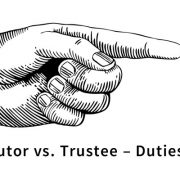Cleveland, Ohio estate planning attorney, Daniel A. Baron, offers information on the differences between and Grantor and a Non-Grantor Trusts and further considerations to as part of your Tax and Estate Plan:

Understanding tax benefits and pitfalls of a trust and putting together a trust which is most beneficial for your personal situation is best left to an experienced trust attorney who can explain the differences in trusts and customize your Estate Plan.
Consequently, understand that the term used; Grantor Trust and Non-Grantor Trust are important. These terms mean very different things but are both associated with tax implications.
The Grantor is the party who establishes the trust and maintains control while living and mentally capable.
Some examples of Grantor Trusts
- Revocable Living Trust
- Dynasty Trust
- Grantor Retained Annuity Trust (GRAT)
- Spousal Access Trusts
- The majority of Irrevocable Trusts
- Defective Grantor Trust (IDGT or DIGIT)
When setting up your trust as part of your Estate Planning, tax planning is an integral part of each and every plan and is as individual as you are.
Planning for Tax implications
How is the trust going to be taxed? Does the American Tax Relief Act of 2012 (ATRA) affect the taxes of your trust? By setting up a Grantor Trust you can realize a number of tax advantages. Some of these advantages are but not limited to:
- Sell assets to the trust and not have to pay for the gains of the sale
- Loan money to the trust – keeping in mind that the trust must pay the minimal IRS interest rate; however the income recognized from the interest is not taxable to you
- The trusts income tax, paid by you (the Grantor), is not viewed as a gift to the trust
Plain and simple, the assets of the trust grows, which in turn benefits the beneficiaries without paying income tax. Essentially this is a tax free gift.
Non Grantor Trust
A Non-Grantor Trust is where the donor of the assets relinquishes all control within the trust. The donor of the trust funds is not a beneficiary or a trustee and has no input on how the funds are disbursed or controlled. When the donor establishes a Non-Grantor Trust (aka irrevocable trust) they give up their rights to amend, revoke, or terminate the trust as this now becomes the functions of the trustee(s) either acting by themselves or with a Trust Protector.
Although the assets used to establish the trust were once owned by the donor, they are now owned by the trust. Any income being generated from the assets now is the sole responsibility of the trust. As is with the Grantor Trust, any distribution to a beneficiary must now the proper IRS forms issued and provided to the recipient.
When a non-grantor trust is established it becomes a taxable entity and a Federal Employer Identification Number is issued. This also means that an income tax return needs to be filed on behalf of the trust each year.
Understanding tax benefits and pitfalls of a trust and putting together a trust which is most beneficial for your personal situation is best left to an attorney who can explain the differences in trusts and customize your Estate Plan. Contact Daniel A Baron of Baron Law Cleveland, Ohio at 1-216-573-3723.









